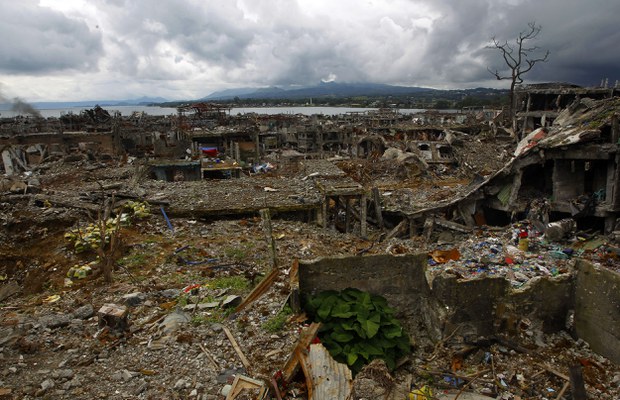Philippines: Groups Question Duterte’s Resolve to Rebuild Marawi
2020.07.28
Cotabato, Philippines
 A section of Marawi is in ruins after government troops took back the southern Philippine city from militants linked to the Islamic State, Oct. 14, 2017.
A section of Marawi is in ruins after government troops took back the southern Philippine city from militants linked to the Islamic State, Oct. 14, 2017.
Southern Philippine officials and rights groups on Tuesday questioned the government’s resolve to rehabilitate the ruined city of Marawi after President Rodrigo Duterte failed to outline plans for it during his State of the Nation Address one day earlier.
The Marawi Reconstruction Conflict Watch, which tracks the rehabilitation’s progress, noted that Duterte had asked Congress to prioritize recovery of the economy through subsidies and loans, but failed to address the concerns of thousands of Marawi residents who cannot return home.
“Well, what about the promised yet much-delayed compensation to stimulate the economy in an area ravaged by war and destitution? When will you direct Congress to prioritize the Marawi Compensation Bill?” the group asked.
Many of Marawi’s displaced residents have been frustrated over stymied efforts to return and rebuild homes destroyed during the five-month battle in 2017 between militants aligned with the Islamic State and government troops. Now they must contend with being locked out during COVID-19 pandemic, the group said.
During his address, Duterte also asked banks and property companies to assist small businesses affected by the coronavirus crisis.
“But what about the Maranao who have been waiting for three fruitless years – way before the pandemic and its consequent economic crisis?” asked the group, referring to the dominant ethnic Muslim group in Marawi.
The Marawi Compensation Bill seeks to allot 30 billion pesos (U.S. $610 million) for Marawi residents whose homes, businesses and properties were destroyed during the battle, which left about 1,200 combatants and civilians dead.
The bill has been filed but was not moved because the government has not released a final list of those who lost property, because many were sitting on untitled land passed on from generation to generation, officials have said.
“We are one with all Filipinos in desiring a quicker release from the health and economic crisis we all face, but how can we trust your word or believe your promises when you have not honored your promises to us,” the group said.
‘Languishing’
Amihilda Sangcopan, a congresswoman representing the special interest group Anak Mindanao, said about 17,000 families remain displaced in Marawi and are living with relatives or in temporary shelters.
“If the rehabilitation of Marawi was not mentioned in the SONA, does this mean it will not be given priority?” she asked, referring to the State of the Nation Address. “We waited for him to make any pronouncement that will somehow hasten infrastructure development in Marawi, but there was nothing.
“The people of Marawi are languishing in this pandemic, too. And their suffering is aggravated by the fact that they cannot even go home because rehabilitation in Marawi has been slow, three years after that siege,” she said.
While building of permanent shelters and rebuilding of damaged mosques have been proceeding slowly, local assemblyman Zia Alonto Adiong said residents need assurances from Congress that members would approve spending for the program going forward.
“I would like to remind the public that though three years may seem a distant past, the recovery and rebuilding of Marawi is still a major part of our current state of the nation,” said Adiong, who during the crisis was the local government spokesman who stayed in Marawi as the battle raged.
Another Muslim leader in Marawi, Drieza Lininding, stressed that many displaced people have been blocked from returning to their properties in the city’s most affected areas over concerns about unexploded ordnance.
“The absence of access to our properties is a human rights violation,” Lininding said, stressing that there have been many incidents of looting and theft in cordoned-off areas of Marawi.
Duterte imposed martial law in the entire south as the battle broke out on May 23, 2017, and allowed it to continue until December 2019, more than two years after the fighting ended, so the military could prevent militants from regrouping and carrying out fresh attacks.
Despite this, violence continued with deadly attacks including a bombing that killed 23 in January 2019 at a church on Jolo island.







